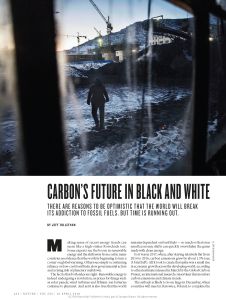Join getAbstract to access the summary!

Join getAbstract to access the summary!
Jeff Tollefson
Carbon’s Future in Black and White
There are reasons to be optimistic that the world will break its addiction to fossil fuels. But time is running out.
Nature, 2018
What's inside?
A ticking clock grows louder as the debate about whether global warming can be controlled continues.
Recommendation
Many climate scientists think the massive scale of worldwide fossil fuel use, combined with lackadaisical remedial efforts by governments, may swamp the 2015 Paris Agreement goal of limiting global warming to 1.5 to 2°C above pre-industrial temperatures. Others contend that precipitous drops in the prices of clean energy sources such as solar, lithium-ion batteries and wind could save Earth from a bleak future. As Nature contributor Jeff Tollefson explains, both sides of the issue could be right.
Summary
About the Author
Jeff Tollefson writes for Nature from New York City.
















Comment on this summary